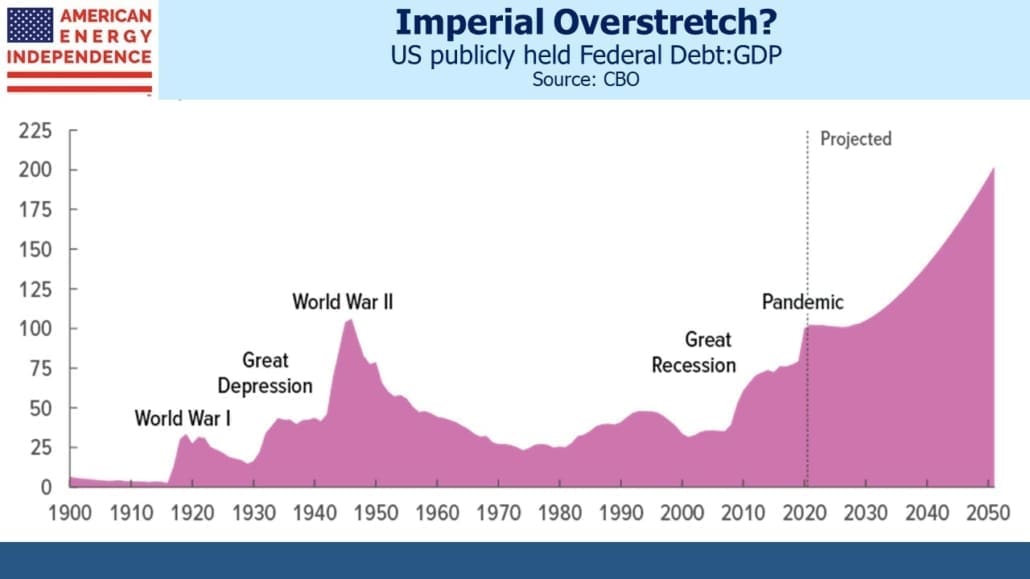US Explores The Limits On Spending
Paul Kennedy’s The Rise and Fall of the Great Powers coined the term “imperial overstretch”. Throughout history, the decline of every great power has coincided with military commitments beyond its means. Such cycles last many decades, and Kennedy’s 1987 book speculated that Japan was the new rising power about to overtake America. That call was spectacularly wrong, but the underlying principles remain valid. After twenty years, almost a $1TN and over 2,300 US military lives lost in Afghanistan, we have little to show for it. America’s humiliating exit from Kabul is not how superpowers conclude military expeditions.
Simple math shows that US military dominance will slowly give way to a multi-power world. War is expensive, and economic size drives success. US share of global GDP has declined from 40% in 1960 to 24% today, as emerging economies such as China have made strides.
Historically, great powers have begun to decline when they continued to assume obligations inconsistent with their capacity to meet them. Such decisions aren’t inevitable, and the arc of history is long. America remains a great country. But it’s useful to consider episodes such as our recent withdrawal from Afghanistan against our growing debt, set to test all notions of sustainability.
America’s debt:GDP is projected to double in the next three decades, according to the non-partisan Congressional Budget Office (CBO). This assumes no new pandemic and no wars, both significant sources of past unplanned spending.
It’s likely we will not acknowledge whatever constraints on our spending this projection should imply. Long term interest rates remain low, helped by the Fed’s monetization of around half of all newly issued Federal debt (see Behind The Fed’s Benign Inflation Outlook).
Modern Monetary Theory (MMT) is the great enabler (see Reviewing The Deficit Myth, Stephanie Kelton’s book on the subject). It teaches that the only constraint on a government’s ability to borrow and spend in its own currency is inflation. Since the Federal government can always issue bonds to the Federal Reserve with its unlimited ability to create the funds to buy them, we always have a buyer of last resort. If government spending goes beyond the economy’s ability to deliver the goods and services offered, thereby driving up prices, inflation results. This is the only practical constraint on the budget deficit.
Forget about our foreign creditors’ willingness to finance our borrowing. The threat of Japan, or in recent years China, dumping US bonds and causing a recession through sharply higher rates has been periodically raised. It hasn’t happened, and likely won’t. They couldn’t sell $1TN in bonds, and if they tried the Fed would undoubtedly step in to manage the process. Ben Bernanke opened the Pandora’s Box of a greatly expanded Fed balance sheet during the 2008 Great Financial Crisis. Having discovered its power, we will steadily increase the set of circumstances that justify such largesse. The bar will be lowered, because it’s apparently costless to do so.
This is why inflation is likely, because there is no other force limiting our ability to borrow. Today’s deficit hawks have lost influence because their message doesn’t resonate. That’s because it doesn’t fit the facts. Their predictions of fiscal disaster make climate change forecasts look astute. The world is 1°C warmer than pre-industrial times if not obviously much worse for it. By contrast, record low bond yields suggest record indebtedness is harmless.
This serves to further increase the government’s perceived ability to borrow, because both the Administration and the Fed assess the current uptick in inflation to be temporary. It may be so, which will show that borrowing hasn’t yet become ruinous. Therefore, more will follow.
Inflation isn’t correctly measured anyway. Statisticians insist on ignoring the rising cost of home ownership even though two thirds of American families choose to obtain shelter that way (see Why It’s No Longer Enough To Beat Inflation). $40BN a month in MBS purchases during a very hot housing market is finally making some FOMC members uncomfortable. Boston Fed president Eric Rosengren recently said, “If you can’t get housing materials and you can’t get construction workers to come back on site, but we do increase demand for housing, then it doesn’t do much for our employment mandate—but it does increase housing prices more than it otherwise would.”
MMT has quietly become mainstream fiscal orthodoxy. Even proponent and author Stephanie Kelton advocated for a CBO-type scoring of the inflationary impact of spending plans. Instead, we are looking at a $3.5TN budget to be passed via reconciliation with no formal consideration of the possible inflationary consequences. If it doesn’t cause the economy to overheat, such budgetary largesse will become business as usual. Inflation is eventually assured.
We are invested in all the components of the American Energy Independence Index via the ETF that seeks to track its performance.
Important Disclosures
The information provided is for informational purposes only and investors should determine for themselves whether a particular service, security or product is suitable for their investment needs. The information contained herein is not complete, may not be current, is subject to change, and is subject to, and qualified in its entirety by, the more complete disclosures, risk factors and other terms that are contained in the disclosure, prospectus, and offering. Certain information herein has been obtained from third party sources and, although believed to be reliable, has not been independently verified and its accuracy or completeness cannot be guaranteed. No representation is made with respect to the accuracy, completeness or timeliness of this information. Nothing provided on this site constitutes tax advice. Individuals should seek the advice of their own tax advisor for specific information regarding tax consequences of investments. Investments in securities entail risk and are not suitable for all investors. This site is not a recommendation nor an offer to sell (or solicitation of an offer to buy) securities in the United States or in any other jurisdiction.
References to indexes and benchmarks are hypothetical illustrations of aggregate returns and do not reflect the performance of any actual investment. Investors cannot invest in an index and do not reflect the deduction of the advisor’s fees or other trading expenses. There can be no assurance that current investments will be profitable. Actual realized returns will depend on, among other factors, the value of assets and market conditions at the time of disposition, any related transaction costs, and the timing of the purchase. Indexes and benchmarks may not directly correlate or only partially relate to portfolios managed by SL Advisors as they have different underlying investments and may use different strategies or have different objectives than portfolios managed by SL Advisors (e.g. The Alerian index is a group MLP securities in the oil and gas industries. Portfolios may not include the same investments that are included in the Alerian Index. The S & P Index does not directly relate to investment strategies managed by SL Advisers.)
This site may contain forward-looking statements relating to the objectives, opportunities, and the future performance of the U.S. market generally. Forward-looking statements may be identified by the use of such words as; “believe,” “expect,” “anticipate,” “should,” “planned,” “estimated,” “potential” and other similar terms. Examples of forward-looking statements include, but are not limited to, estimates with respect to financial condition, results of operations, and success or lack of success of any particular investment strategy. All are subject to various factors, including, but not limited to general and local economic conditions, changing levels of competition within certain industries and markets, changes in interest rates, changes in legislation or regulation, and other economic, competitive, governmental, regulatory and technological factors affecting a portfolio’s operations that could cause actual results to differ materially from projected results. Such statements are forward-looking in nature and involves a number of known and unknown risks, uncertainties and other factors, and accordingly, actual results may differ materially from those reflected or contemplated in such forward-looking statements. Prospective investors are cautioned not to place undue reliance on any forward-looking statements or examples. None of SL Advisors LLC or any of its affiliates or principals nor any other individual or entity assumes any obligation to update any forward-looking statements as a result of new information, subsequent events or any other circumstances. All statements made herein speak only as of the date that they were made. r
Certain hyperlinks or referenced websites on the Site, if any, are for your convenience and forward you to third parties’ websites, which generally are recognized by their top level domain name. Any descriptions of, references to, or links to other products, publications or services does not constitute an endorsement, authorization, sponsorship by or affiliation with SL Advisors LLC with respect to any linked site or its sponsor, unless expressly stated by SL Advisors LLC. Any such information, products or sites have not necessarily been reviewed by SL Advisors LLC and are provided or maintained by third parties over whom SL Advisors LLC exercise no control. SL Advisors LLC expressly disclaim any responsibility for the content, the accuracy of the information, and/or quality of products or services provided by or advertised on these third-party sites.
All investment strategies have the potential for profit or loss. Different types of investments involve varying degrees of risk, and there can be no assurance that any specific investment will be suitable or profitable for a client’s investment portfolio.
Past performance of the American Energy Independence Index is not indicative of future returns.




Leave a Reply
Want to join the discussion?Feel free to contribute!